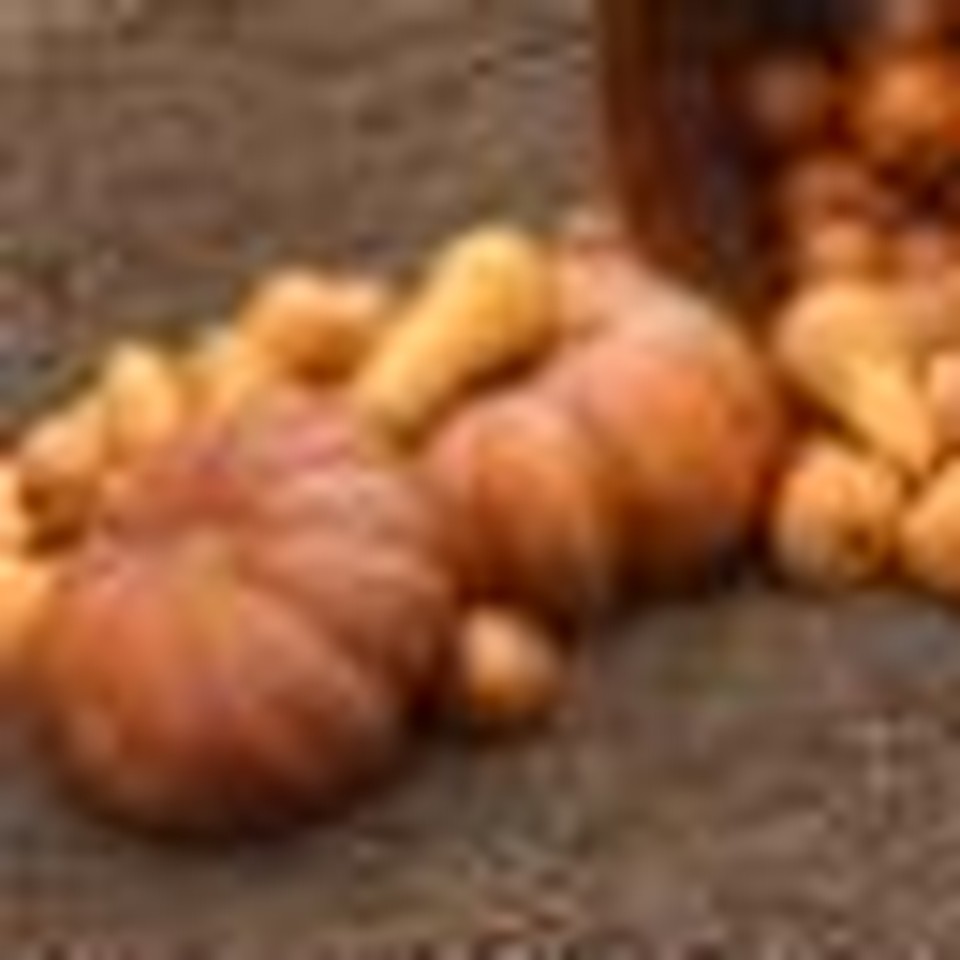Fall Harvest: Where's the Fruit?

Empty cornucopias. In my heart and in my house, that which should be full of the fall harvest of God’s goodness and righteousness is sometimes hauntingly empty. Do you ever feel that way? Where is that harvest I am supposed to have? Why doesn’t my family have any of the kind of fruit I am looking for? Why do my children seem so bare?
As I ponder this season, I wonder about the harvest that will come from my children’s lives. I always wonder what they are going to grow up and be or do. I wonder if they are going to follow the Lord or their own desires. I wonder if they will be great and give glory to God and just what kind of fruit they will bear. And on those extra hard days, I even wonder if they will just remain heathens forever or follow me to the very gates of hell! Depressing thoughts all. But by the end of this article, I trust I’ll show you something optimistic and hopefully even beautiful.
In each of our lives, we may go through seasons that seem like the death of winter or sometimes the heat of summer or the wonder of fall or even the newness of spring. Seasons change in our lives, the weather changes in our circumstances, and what grows in each season is different too—not only for us, but for our children as well.
When the children are young, it can look like there is little or no fruit on those little vines, and then—suddenly—we see very tiny sprouts. When they get a bit older, we begin to see character traits that need working in or sin natures that need working out as our children grow like weeds. As they enter their teens, we begin to see buds of fruit and sometimes observe turbulent winds and rain, and then as they mature into adults, we will hopefully see strong stems and fruits that are becoming ripe for the picking, fruit that can be shared.
Let’s go through these stages together as I share where I have lacked and what I have learned, and maybe we can see a pattern of things we need to be doing (or not doing) to ensure a good harvest in our children’s lives and in our own hearts.
Where’s the Fruit: In the Very Young
When our children are very young, we wonder when it is that we will get to reap what we’ve sown into them day in and day out. When will we get to see that beautiful bounty, or will there even be any? Will it be full and beautiful, or will they end up like the fig tree that Jesus cursed when it held nothing of value to Him? We so desire that our children will eventually produce fruit, but what we often don’t realize is that today’s seeds hold the key to the fruit they will produce tomorrow and even years from tomorrow. But they will produce absolutely nothing if we do not prepare the soil and continue to sow seeds day in and day out. Don’t give up! Harvest time will come!
“And let us not be weary in well doing: for in due season we shall reap, if we faint not.” (Galatians 6:9)
In these early years, I have both overestimated and underestimated that which is required in the caretaking of my little ones’ fertile ground, and lazy weeding has produced a lack of character growth.
Overestimating
Here’s a little sad-but-true story to illustrate what I am talking about. We normally have all of our children with us in service at church, but after baby Jacob was born, I needed to nurse him, so I would take my two little girls (5 and 3) and the baby and we would head to the Sunday School class together. Recently, the teacher was discussing Noah’s ark, and at first I thought, “What child doesn’t know about Noah and that huge boat of his?” But then the teacher began to ask specific questions about how many days it rained and what the rainbow meant, and I was shocked and even embarrassed to realize that my two little girls had no idea what the answers were.
I was shocked because I knew I had taught it to all my older children and they knew all the details very well; I just thought that the younger ones knew all these things too. I overestimated their knowledge. Somehow, with my focus on my older children, my younger ones were falling through the cracks. As our family had grown, I had not maintained the same consuming focus on the Bible with these younger ones. I knew at that moment that I had better change that and change it quickly—not just so that they will know all the neat Bible stories that kids this age love, but so that they will know the God of the Bible and will love Him and love His Word, so that seeds of Scripture would be sown into their hearts. I can’t leave the sowing to someone else.
Underestimating
What I always underestimate is the fact that they are like sponges at this age. We’ve heard that and seen it in our own children, so why don’t we take advantage of that fact? We should be pouring into our children the seeds of God’s Word for memorization and for wisdom, so that as they grow, those seeds will grow and do their work in those little hearts.
My lame excuse has been busyness, but it has really proven to be laziness. I have not been intentional in the things I desire for them to learn. And, if I am not intentional, if I don’t deliberately plan to soak them in the Word, it won’t happen by accident. If I don’t make time to pour into them, no one will, and I will lose for time and eternity the golden moments, those opportunities to plant seeds in that rich soil, which is so ready to receive those seeds.
“The sluggard will not plow by reason of the cold; therefore shall he beg in harvest, and have nothing.” (Proverbs 20:4)
This is an age when we can start Scripture memorization with them and show them the necessity of intimate prayer. We can read the Bible aloud to them just like we read aloud other books that we love.
Lazy Weeding
Lazy weeding means that I am sometimes slack in disciplining and admonishing consistently. If I do not faithfully and diligently “weed” that rich soil, I just might be totally embarrassed by their behavior, and worse yet, my children may become unteachable. The weeds of self-will pop up everywhere at this age, and if they are not uprooted each time, they will take hold and take over and choke out anything else we try to plant.
There are times when I have been humiliated by something my child said or did, and then I have to look at the root of the problem, which usually pointed to my lack of care in that area of their lives. I had let things go. I didn’t stay on top of pulling that weed. I was busy and left them to themselves for too long. I didn’t deal with it at home on a regular basis, so I was publicly embarrassed by it. The Scripture makes this point perfectly clear: “The rod and reproof give wisdom: but a child left to himself bringeth his mother to shame.” (Proverbs 29:15)
However, when we pour the Word into their little hearts and pull the weeds of self-will, we will see growth. The peaceable fruit of righteousness will begin to form little shoots in their hearts and lives. These precious little ones no longer will bring us to shame, but instead they will honor us and be a blessing to others, yielding good fruit.
“Now no chastening for the present seemeth to be joyous, but grievous: nevertheless afterward it yieldeth the peaceable fruit of righteousness unto them which are exercised thereby.” (Hebrews 12:11)
Where’s the Fruit: In the Elementary Years
I’ve always greatly admired my friend Sandy. She is the mother of fourteen children, a loving and devoted wife, a homeschooler extraordinaire and, on top of all that, she has a green thumb! Before you roll your eyes and turn to the next article, let me just say this: she’s not perfect and neither are her children (and she’ll even admit it). The thing I most appreciate about Sandy is that she always shares with us her mistakes and what she has learned from the Scriptures to equip her to correct those mistakes.
Recently Sandy told us about the lessons she had learned from her cornfield. I had to smile at the story she told about her harvest of corn this year. Her corn patch only produced three small ears of corn. She quickly ate one cob and squirreled the other two away in the refrigerator, and they went bad. She told us about all the money, time, and energy wasted on that patch of corn, which yielded only one edible fruit.
She realized there were two things that caused this deficient harvest: lack of soil preparation and inconsistent watering. Her words were: “I was in a hurry to get that corn planted and did not take the time to add to the soil the nutrients that corn needs to grow. I thought of how many times I have done this with my children. You know, it’s the ‘Quick! Let’s get our Bible time done, so we can get busy with the “real” school work.’ But the reality is, that when we are teaching our children out of God’s Word, we are preparing the soil for everything else that goes in as well.”
It takes time to prepare the soil, and it takes time to prepare the hearts of our children, but we tend to run around in circles and tire ourselves out so much that we have no time to “prepare” anything of value.
During the season when our children are no longer very young but are entering the elementary years, how do we prepare their hearts and make them soft to receive seed from us and from God? I have found, by trial and error, that the following list is especially helpful in preparing these young hearts.
Preparation of Soil to Receive Seed
A haughty, frustrated spirit in me only produces more haughty, frustrated children after me. I have found the Scripture to be very true, that it has been “kindness that leads to repentance.” In other words, we need to live it in order to sow it. As Sandy says: “When we are teaching about a God who loves them, they need to experience that love through us. We teach them their need for God’s forgiveness as we forgive them. They also need to know how important it is to forgive others, so it is by us asking their forgiveness when we have been harsh, or misjudged them, or whatever the offense, that they learn how to forgive.”
“For if ye forgive men their trespasses, your heavenly Father will also forgive you: But if ye forgive not men their trespasses, neither will your Father forgive your trespasses.” (Matthew 6:14–15)
Returning to Sandy’s pitiful cornfield, she said that besides the lack of soil preparation “was the inconsistent watering. Some days I would water in the morning and then skip it until the next evening. Sometimes I would be in a hurry and just give them a little water, and other times I would leave the hose there and flood them. This produced dwarfed plants. Some of my plants never grew bigger than 6 inches tall. A 6-inch plant does not produce corn. Many of the plants were too thin and malnourished to even support any corn on them—all because I did not take the time to consistently water those plants.”
How can we make sure our children are refreshed and strengthened and that these young plants are being watered?
Watering the Young Plants
- Consistency in the Word of God
- Daily washing with the water of the Word of God
- Pointing to Jesus, who is their Living Water
- Planting close by the source of the Water
“But his delight is in the law of the Lord; and in his law doth he meditate day and night. And he shall be like a tree planted by the rivers of water, that bringeth forth his fruit in his season; his leaf also shall not wither; and whatsoever he doeth shall prosper.” (Psalm 1:2–3)
Here is true wisdom I gleaned from my friend that day: “Why am I so inconsistent? It’s because I haven’t really made knowing Christ the priority. I allow other things, less important things, to take up my time, instead of spending it with Him. In doing this, I am teaching my children to do the same.” What about you? Are you taking the time to “water” your plants? With a lack of water comes a lack of fruit.
Where’s the Fruit: Entering the Teen Years
No longer kids, not quite teens—these years are filled with changing ideas, attitudes, and bodies. These years can be somewhat unstable, but I think there is a purpose for the turbulence: to strengthen and sharpen these children, who are preparing for a season in which they will be given the privilege of bearing more responsibility. It is a time when they begin to start working out and walking out and living out these things that we’ve been sowing into them all these previous years—as their choices.
Does it seem like you are always rubbing each other the wrong way at this age? Maybe you’re rubbing each other the right way. Let’s look at this Scripture: “Iron sharpeneth iron; so a man sharpeneth the countenance of his friend.” (Proverbs 27:17)
As we sharpen each other, we make each other stronger, more useful and more productive, for the glory of God. Why does the “sharpening” occur so frequently? Because we live together 24/7, we have ample opportunity to do some sharpening. And let’s not forget what else sharpens us: “For the word of God is quick, and powerful, and sharper than any two-edged sword, piercing even to the dividing asunder of soul and spirit, and of the joints and marrow, and is a discerner of the thoughts and intents of the heart.” (Hebrews 4:12)
This is also a time where our pre-teens may struggle to produce fruit. This is the season when I remind them (and myself) that it is the work of the Spirit to conform us to the image of Christ, as we give control of our flesh over to God. I teach my children that self-control really comes from putting ourselves under God’s control.
“But the fruit of the Spirit is love, joy, peace, longsuffering, gentleness, goodness, faith, meekness, temperance: against such there is no law.” (Galatians 5:22–23)
Recently I had been praying and hoping for a passion for Christ to make itself evident in my children. I wanted to see a transformation. I saw a glimpse recently as one child was quoting Scripture to me in regard to how the Lord was helping this child deal with some challenges, and I realized that although this child hadn’t had some sort of outward “spiritual experience,” the Word of God that I had sown over the years was bringing inward change. The sowing of seed, God’s Word, into their minds was transforming their hearts. On the inside, where I could not observe it, metamorphosis was taking place; God’s Word was doing its work.
“And be not conformed to this world: but be ye transformed by the renewing of your mind, that ye may prove what is that good, and acceptable, and perfect, will of God.” (Romans 12:2)
Where’s the Fruit: In the Higher Education Years
The teen-to-adult years tend to be a delightful culmination of reaping where we have sown. Let me quote from the September issue of the Schoolhouse Support E-Newsletter:
We trained them in respect when they were young, so are reaping blessed companionship now. We have sown discipline, so we are reaping self-control and maturity. We taught them how to learn and how to teach themselves and are reaping teens that can learn anything and excel. We have sown scripture and a biblical worldview and are reaping young people who are more interested in truth than in cultural fads and foolish friends. We have trained them in work and service and are reaping the benefits of responsible young adults. We do more than "survive" or "endure" or "live to tell about it." We are blessed to be among those who actually enjoy and are very proud of their teens.
There is bounty not only for those who labored, but also for those who just come by to share in the fruit. This teen-to-adulthood season becomes a time when they learn to share with others, to start investing themselves and their work with a perspective that is focused on eternal things.
Where’s the Fruit: In Us
What about us parents? Where’s our harvest? Sometimes I feel like Sandy’s corn stalks that produced so little corn. Those stalks had the appearance of corn, with their long stems and green leaves and looking bountiful from a distance, but upon closer inspection, they were found to be fruitless and useless to the planter. I remembered again the fig tree that looked so beautiful but had nothing to offer Jesus. Ouch. How many times have I put more effort in making myself look good or making my house look good or desiring that my children look good (or at least make me look good), yet failing to offer anything of substance to Jesus? So many times I have been fruitless and useless to the Planter. My desire is to produce fruit for Him, and I desperately want to raise my children to do the same. Let’s ask the Sower to plant, water, and bear in us fruit that lasts, so that the seeds of the Word of God will go deep and the cares of the world will not choke them out. (See Matthew 13:18–23.)
Death Brings Forth Life
One year while looking at all the fall colors, I realized that only God can make death look beautiful. Only God can create life from death. As the leaves change color and die, they provide a new beauty to behold. In the same way, we must die to ourselves in order to become beautiful, fruitful parents who will bear fruit: “Verily, verily, I say unto you, Except a corn of wheat fall into the ground and die, it abideth alone: but if it die, it bringeth forth much fruit.” (John 12:24)
Not only can God create life from death in our own lives, but He also says He will multiply the seed that we are sowing and increase our fruit. This is a wonderful promise:
And God is able to make all grace abound toward you; that ye, always having all sufficiency in all things, may abound to every good work: (As it is written, He hath dispersed abroad; he hath given to the poor: his righteousness remaineth for ever. Now he that ministereth seed to the sower both minister bread for your food, and multiply your seed sown, and increase the fruits of your righteousness;) being enriched in every thing to all bountifulness, which causeth through us thanksgiving to God. (2 Corinthians 9:8–11)
Consider Your Ways
Sandy asked us to consider ourselves and our families: “Is there unity or division, joy or sorrow, humility or pride? Are you washing your children with the water of the Word? May we be faithful to water our plants with Jesus, who is the Living Water, and in doing so, may we produce a harvest of much fruit.”
“Blessed is every one that feareth the Lord; that walketh in his ways. For thou shalt eat the labor of thine hands: happy shalt thou be, and it shall be well with thee. Thy wife shall be as a fruitful vine by the sides of thine house: thy children like olive plants round about thy table” (Psalm 128:1–3)
Deborah Wuehler is the Senior Editor for TOS, editor of the Schoolhouse Support E-Newsletter, wife to Richard, and mom to eight gifts from heaven. She loves digging for buried treasure in the Word, reading, writing, homeschooling, and dark chocolate!
Copyright 2008 The Old Schoolhouse Magazine, LLC
www.thehomeschoolmagazine.com
This article orginally appeared in the Fall 2008 issue of The Old Schoolhouse Magazine, LLC
Reprinted with permission from the publisher
Originally published December 01, 2008.





